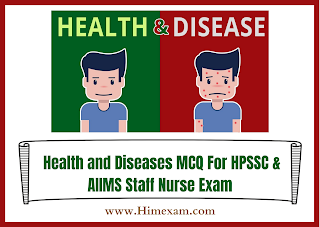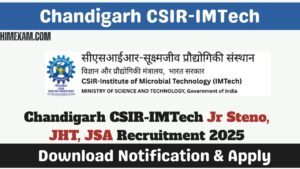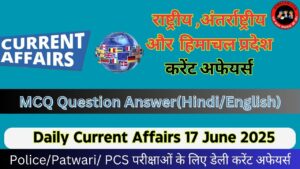Health and Diseases MCQ For HPSSC & AIIMS Staff Nurse Exam
||Health and Diseases MCQ For HPSSC & AIIMS Staff Nurse Exam||Health and Diseases Question Answer For HPSSSB & AIIMS Staff Nurse Exam||
1. One of the following is not true international classification of disease (ICD):
(a) It is revised once in 10 years
(b) It was devised by UNICEF
(c) The 10th revision consists of 21 major chapters
(d) It provides the basis for use in other health fields.
(e) It is accepted for National and International use.
2. The concept of social Medicine was first introduced by:
(a) Neumann and virchow
(b) Robert Gritjahn
(c) John Ryle
(d) Rene Sand
(e) Crew
3. Prophylactic https://himexam.com/wp-content/uploads/2021/12/Madhya-Pradesh-MP-PEB-Group-2-Sub-Group-4-Various-Post-Answer-Key-2021.jpgistration of vitamin A in a child is:
(a) Health promotion
(b) Treatment
(c) Specific protection
(d) Rehabilitation
4. The restoration of body function is known
(a) Vocational rehabilitation
(b) Primary prevention
(c) Social rehabilitation
(d) None of these
5. False about primary prevention is:
(a) Early diagnosis and treatment
(b) Environmental sanitation
(c) Vaccination
(d) Health promotion
6. About community diagnosis all are true except: as:
(a) Virtual statistics taken
(b) Age and sex distribution statistics needed
(c) Age specific, death rate needed
(d) Incidence of important diseases taken
7. Administration of oral polio vaccine to the children is a measure of:
(a) Health promotion
(b) Specific protection
(c) Treatment
(d) Rehabilitation
8. Which of the following constitutes specific protection?
(a) Immunization
(b) Aviodance of allergens
(c) Healthy environment
(d) Chemoprophylaxis
9. Which of the following is tertiary level of prevention?
(a) Health promotion
(b) Specific protection
(C) Early diagnosis and treatment
(d) Disability limitation
10. Screening for carcinoma cervix is:
(a) Health promotion
(b) Specific protection
(c) Early diagnosis and treatment
(d) Disability limitation
11. Iron and folic acid supple-mentation is type of:
(a) Specific protection
(b) Health promotion
(c) Health education
(d) Primordial protection
12. The current concept of health promotion and the related activities lead to:
(a) Better treatment of a problem
(b) Critical awareness and lifestyle changes
(c) Adoption of prophylactic services
(d) Better health services usage
👉HPSSC STAFF NURSE EXAM TEST SERIES (10 TEST WITH ANSWER KEY)
13. The best method of promoting healthy lifestyle in children:
(a) Primordial prevention
(b) Specific protection
(c) Secondary prevention
(d) High risk strategy
14. All are health promotion activities except:
(a) Better treatment of a problem
(b) Critical awareness and lifestyle changes
(c) Adoption of prophylactic services
(d) Better health services and usage
15. Primary aim of sentinel surveil-lance is:
(a) To know total number of disease patient
(b) To know trend of disease
(C)To decide mode of treatment
(d) Notification
16. Primordial prevention is applied when:
(a) Risk factors appear before disease
(b) After risk factors appear
(c) Prevalence of disease is low
(d) No disease and no risk factors
17. False about primary prevention is:
(a) Early diagnosis and treatment
(b) Environmental sanitation
(c) Vaccination
(d) Health promotion
18. Which type of prevention used in change of smoking habit?
(a) Primordial prevention
(6) Population (mass) strategy
(c) High risk strategy
(d) Secondary prevention
19. Tertiary level of prevention is:
(a) Health promotion
(b) Chemoprophylaxis
(c) Rehabilitation
(d) Early diagnosis and treatment
20. Sentinel surveillance is done for all except:
(a) HIV
(b) Diarrohea
c) Acute flaccid paralysis
(d) Per capita income
21. A concept directed against prevention of risk factors of CAD is:
(a) Primordial prevention
(b) Secondary prevention
(c) Health education
(d) Primary prevention
22. Total morbidity is determined by:
(a) Active surveillance
(b) Passive surveillance
(c) Sentinel surveillance
(d) Annual survey
23. Pap smear is an example of:
(a) Primary level of prevention
(b) Secondary level of prevention
(C) Tertiary level of prevention
(d) None of above
24. Keeping the frequency of illness within acceptable limits is best described as disease:
(a) Control
(6) Prevention
(c) Eradication
(d) Surveillance
(e) Treatment
25. Match List I (activities) with List II (levels of prevention) and select the correct answer
using the codes given below the lists:
List-I
A. Post exposure prophylaxis with rabies vaccine
B. Screening for hypertension
C. Surgical intervention for claw hand in leprosy
D. Preventing emergencey of high prevalence of obesity in the population
List-IT
1. Secondary level prevention
2. Tertiary level prevention
3. Primordial prevention
4 Primary level prevention Codes:
Codes:-
(A) (B) (C) (D)
(a) 4 3 2 1
(b) 4 1 2 3
(C) 2 1 3 4
(D) 1 2 4 3
26. Main purpose of sentinel surveillance is:
(a) To find out total number of cases
(B) For intervention of thera-peutics
(c) To depict natural history of disease
(d) Prevention of sentinel piles
27. Which one of the following is not a socioeconomic indicator?
(a) Literacy rate
(B) Family size
(c) Housing
(d) Life expectancy at birth
28. The measure used to express the global burden of disease i.e., how a healthy life is affected by disease, is:
(a) Disability-adjusted life year
(6) Case fatality rate
(c) Life expectancy
(d) Age-specific incidence rate
29. Most important epidemiological tool used for assessing disability in children is:
(a) Activities of daily living (ADL) scale
(B) Wing’s handicaps, behaviour and skills (HBS) schedule
(c) Binet and Simon IQ tests
(d) Physical quality of life index (PQLI)
30. The burden of disease is best represented by:
(a) Infant mortality rate
(6) DALY’s
(c) PQLI
(d) Case fatality
31. Lungs are enclosed in:
(a) Pericardium
(b) Pleura
(c) Peritoneum
(d) Perichondrium
32. Objectives of the health services include each of the following except:
(a) Delivery of curative care only
(B) Health promotion
(c) Prevention control, or eradication of disease
(d) Treatment and rehabilitation
33. PQLI includes all except:
(a) Per capita income
(B) Life expectancy at age 1 year
(c) Literacy
(d) Infant mortality
34. Shape of an eye is maintained by
(a) Aqueous humour
(B) Vitreous humour
(c) Conjunctiva
(d) All of these
👉Medical Abbreviations For HPSSC & AIIMS Staff Nurse Exam
||Health and Diseases MCQ For HPSSC & AIIMS Staff Nurse Exam||Health and Diseases Question Answer For HPSSSB & AIIMS Staff Nurse Exam||
MORE:- Daily HP GK Online Quiz-5 In English









